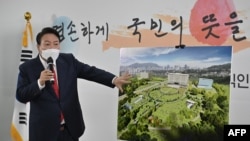Almost every morning before he starts work, South Korea’s new president stops to chat with a scrum of journalists camped in the lobby of his presidential office. Standing on a red carpet in front of a row of flashing cameras, boom microphones, and reporters trying to out-shout one another, Yoon Suk Yeol offers opinions on a range of issues, both serious and lighthearted.
Yoon has weighed in on whether the K-Pop group BTS should receive exemptions from mandatory military service. He has commented on when North Korea will conduct its next weapons test. He regularly answers questions about his wife, whose extravagant personna and busy public schedule have drawn constant media scrutiny. On one occasion, he casually invited a reporter to a meal of kimchi stew.
It’s the fulfillment of a campaign promise for Yoon. A conservative political outsider who had never held elected office, Yoon pledged to be more accessible than past South Korean presidents, many of whom were criticized for doing too few media engagements.
While Yoon’s informal communications style would be routine in many countries, it is unprecedented in South Korea. Outside of annual press conferences, South Korean presidents rarely meet the media. When they do, their comments are typically deliberate, formal, and unremarkable.
As a result, Yoon’s so-called “doorstepping” sessions are causing a major stir in South Korean political circles. Critics say his behavior is shallow and undignified, lowering the standards of political etiquette. It’s “childish small talk,” said Yu Hyun-jae, professor of communications at Seoul’s Sogang University. “This kind of casual language may have developed in the United States, but there’s no such culture in Korea,” Yu told VOA.
Even some of Yoon’s conservative allies are uneasy with his unconventional communications style. In an interview with local media, Kim Jong-in, the former head of South Korea’s main conservative party, said Yoon’s remarks have been inappropriately simplistic. Political rhetoric, Kim said, should not be constructed “in a way ordinary people talk." “Since the president’s words are delivered directly to the public, they should be very sophisticated and deliberate," he added.
Setting the agenda
So far, South Korean media are making the most of the new president’s approachability. Yoon’s impromptu remarks dominate political coverage, generating breaking news alerts and sparking fresh news cycles that serve as fodder for heated talk show debates throughout the day.
Some critics worry Yoon will use that feedback loop to frame public debate or create distractions, especially as his political fortunes seem to worsen. Barely a month after taking office, Yoon’s approval rating has already sunk below 45%.
Yoon’s defenders say it’s only natural to use the presidency to set agendas in a democracy, where the power of persuasion is key to enacting policies. Yoon, they argue, is only speaking directly to the people, circumventing media outlets widely seen as biased.
That kind of tactic is increasingly common in democracies around the world. In the United States, ex-President Donald Trump spoke to reporters several times a day and shared his thoughts on a near constant basis using social media.
There’s only one Trump
Some analysts have compared Trump and Yoon, noting both men are relatively non-ideological outsiders with little political experience before becoming president.
But the comparison only goes so far. Whereas Trump, a former TV game show host, had decades of working with or in the media, the ex-prosecutor Yoon often appears uncomfortable in front of the camera. Many of his allies fear he will make gaffes.
Another difference: Yoon does not employ social media in the same way as Trump, who would often use Twitter to lob highly personal insults at his critics and rivals.
“Trump’s outreach was usually to obfuscate or self-promote,” whereas Yoon “seems to be answering questions seriously and making a good faith effort,” said Robert Kelly, a professor of political science at South Korea’s Pusan National University.
“Any president in a democracy has massive agenda-setting power — the bully pulpit and all that. I don’t find that a big deal,” Kelly added. “If Yoon is monopolizing the discussion, [Korean lawmakers] can push back.”
But concerns about Yoon’s media approach may linger, in part because of the young nature of South Korea’s democracy. In the view of one journalist at a left-leaning newspaper, many South Koreans remember the country’s previous military rule, when newspapers dutifully published the president’s words on their front pages every morning. While today’s dynamic may be fundamentally different, Yoon’s approach still makes many Koreans uncomfortable, said the journalist, who did not receive permission to discuss the issue publicly.
As a solution, the Kwanhun Club, a non-partisan association of Korean journalists, proposes reducing the size of the media pool camped outside Yoon’s office. Such a restructuring, the organization says, would make the doorstepping sessions more substantive, in part by improving the quality of questions. The presidential office has not yet responded to the proposal, the Kwanhun Club said.
In the meantime, Yoon appears to be getting more comfortable engaging the media. In recent weeks, his doorstepping sessions have lasted for a longer time — giving both his supporters and critics more to debate.
“It could be regarded as positive if he is trying new things,” said Lee Junhan, a professor at Incheon National University. “But if it merely ends up being a show, that’s a problem.”






